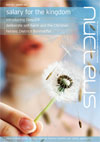Laurence Crutchlow is a London GP and CMF Associate Head of Student Ministries.
God is still present when we are outside our comfort zone. Perhaps many of us perceive his presence even more in times of challenge, or outside our normal environment.
Returning home from any length of time abroad reminds us that we are often most comfortable at home. Often it is the little things: British road signs; favourite food brands. Both Alasdair Menzies' (page 6) and Stephen Hogg's (page 19) articles show us how we might see God when working somewhere different, whether in a medical or evangelistic context. We hope these stories will inspire you to consider an elective in a less developed country, or serving as part of a CMF summer team. The CMF website gives information about both. (1)
Medics often erroneously believe illness to be something that happens to our patients, but not to us. Yet the powerful personal story in Deliberate self-harm and the Christian (page 22) reminds us that healthcare students can become ill, and be taken well beyond our comfort zone. Even then, God was powerfully present in the author's illness and recovery.
We might also become pressured by events around us. How might we respond to ongoing debate about junior doctors' contracts (page 4)? I doubt that Dietrich Bonhoeffer (page 31) expected to find himself on the frontline of the fight against Hitler; yet God was with him there, and has powerfully used the testimony of Bonhoeffer's conduct in those times. I hope we will not have to fight such an evil regime; but can we be sure in such an unstable world?
Talking about Jesus with our friends often feels difficult; often we find it easier to focus on (peripheral) things like swearing, rather than the gospel message. Bernard Palmer tackles this tension in What thrills me? (page 8).
Although it isn't all about being able to answer our friends' questions, thinking through the common ones can quell some of our fears, and indeed strengthen our own faith. Apologetics: one way to God (page 26) looks at how we handle different claims to truth.
The remaining two articles look at times when perhaps we don't feel under pressure. Are these actually more dangerous, as it is easy to work well within our comfort zone, not truly involving God? Yet our day to day work really matters to him. Our values: public health (page 16) explores the big difference that we can make when, having cared for the patient in front of us, we consider the wider picture.
Our cover story (page 11) looks at how we use our money. Ed Foster shows us how far money can go in training pastors for congregations overseas, and challenges us to consider how much we might be able to give to such important work, both now and in the future.
We hope that this issue will enable you to see God at work in your life whether this is a busy but stable period, a time of transition or even a time of crisis.
PS - we will be undertaking a survey of Nucleus readers in January 2016 as we look at future plans. Please do respond and share your ideas.
































